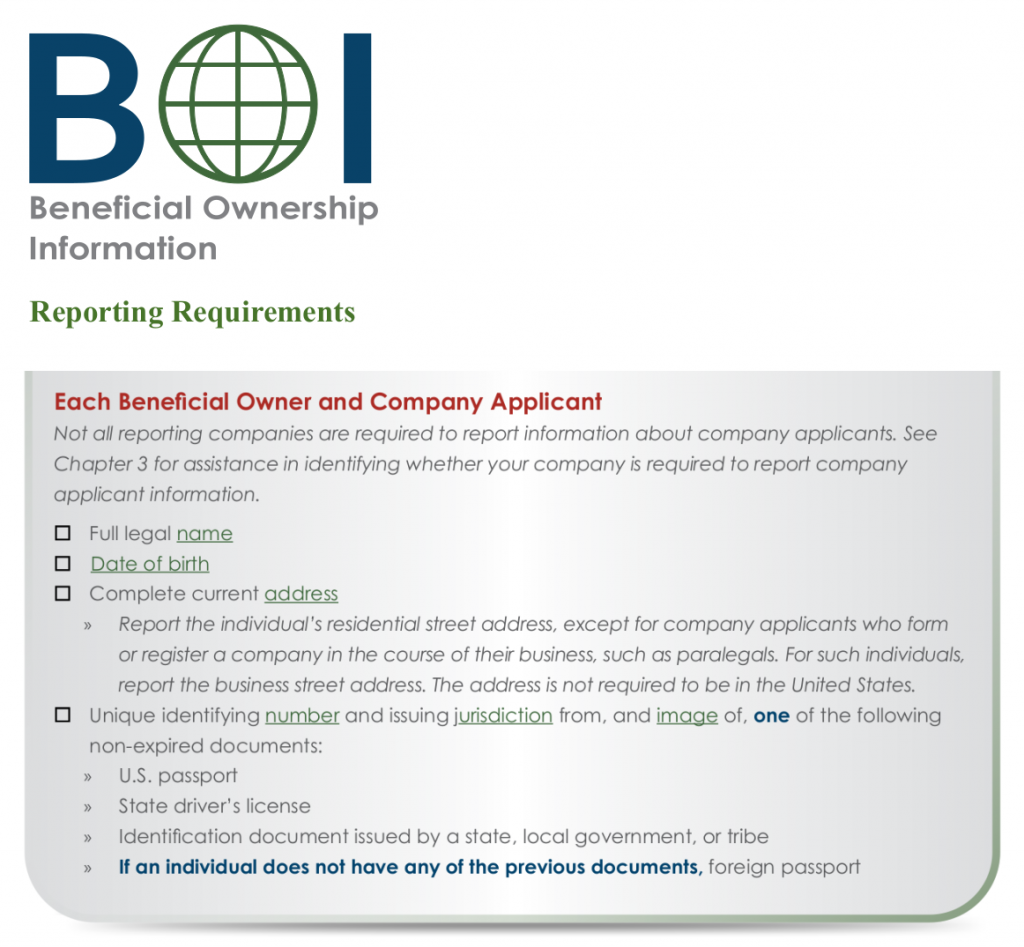IDs and mug shots now required from all corporate principals
This month the Financial Crimes Enforcement Network (FINCEN) division of the Department of the Treasury began collecting copies of passports, drivers licenses, and other ID documents submitted by officers and owners of all sorts of companies.
In other words, you now have to have a government-issued ID and provide an image of it, probably including your photo, to the Federal government in order to establish, serve as an executive of, or hold a major interest in almost any type of corporation, LLC, partnership, trust, etc. (with some odd and irrational exceptions).
The Federal Corporate Transparency Act, which was included in the National Defense Authorization Act for Fiscal Year 2021, requires the filing with FINCEN of a list of all “beneficial owners” of most US companies.
Beneficial owners include all senior corporate officers, decision-makers, silent partners, beneficiaries, and anyone with more than a 25% ownership interest.
The Beneficial Ownership Interest (BOI) report filed with FINCEN must include the “full legal name”, data of birth, complete residential street address, and the number, issuing jurisdiction, and an image of a government-issued ID document for each beneficial owner.
An image of an ID for each beneficial owner is required, but neither the law nor the implementing regulations requires that the ID include a photo. Any “identification document issued by a state, local government, or tribe” satisfies the law and the regulations. A borrower ID card from a local public library, with or without a photo, appears to satisfy the letter of the law and the regulations.
It remains unclear, however, what FINCEN will accept. Let us know what ID you submit to FINCEN, whether or not it includes a photo, and whether FINCEN accepts it.
Millions of companies and individuals, including personal corporations, trusts, and LLCs, will be affected by this ID and reporting requirement.
Certain categories of companies are excepted from the BOI reporting requirement. They are mostly companies in specially regulated industries (banking, securities, etc.) subject to other reporting requirements, but those requirements don’t generally include providing images of owners’ or officers’ IDs. So the owners of large banks, which aren’t subject to BOI reporting, can remain faceless, but not the owners of the smallest shops or personal LLCs.
As was pointed out to FINCEN in public comments on its BOI regulations, not everyone has or can obtain government-issued ID. But the ID requirement is spelled out in the statute, so FINCEN couldn’t overide it in its regulations.
Foreign citizens who don’t have US-issued ID can submit images of foreign passports. But stateless people not eligible for US-issued ID would appear to be out of luck.
Repressive governments sometimes withhold or confiscate passports from persecuted individuals and groups. Passports are often lost or stolen in the course of flight from persecution. As a result, many qualified asylum seekers don’t have passports and aren’t in a position, without returning to places of persecution, to try to get them. They too, and businesses that want to employ them in decision-making positions, would appear to be out of luck.
FINCEN began accepting BOI filings on January 1, 2024, and all entities subject to this law must file the required information including images of IDs by January 1, 2025. New entities formed in 2024 must file within 90 days of their creation. Starting in 2025, all new entities or changes in reported information by existing entities (for example, if any officer’s or owner’s home address or passport number changes) must be reported within 30 days.
The law and the regulations are silent on what a company can do if it is unable to comply, but it appears that it is required to dissolve and wind up its business by the end of 2024. If a company has hired a lawfully admitted refugee in a responsible position who doesn’t have and can’t get the required ID, the company appears to be required to fire or demote them before the end of 2024.
In promulgating its BOI rules, FINCEN argued that, “The process of obtaining BOI through grand jury subpoenas and other means can be time-consuming.”
Whether that’s true or not — and we think it’s not, given the lack of meaningful scrutiny by judges of most warrant applications — it’s not a sufficient excuse for ignoring the 4th Amendment. There’s no probable cause to believe that every owner of a corporation is guilty of a crime.
FINCEN made clear in its regulations that the reason for requiring images of IDs is to construct a database usable for general law enforcment and surveillance purposes, and moreover, that the specific goal is to shortcut warrant requirements or procedures:
After careful consideration, FinCEN continues to believe that collecting images from a reporting company in connection with a specific beneficial owner or company applicant will contribute significantly to maintaining a BOI database that is highly useful in facilitating national security, intelligence, and law enforcement activities…
In addition, images of identification documents will assist law enforcement in accurately identifying individuals in the course of an investigation because those scans will contain a picture of the person associated with the identifying number. While law enforcement may be able to secure copies of driver’s licenses or passport pages through alternative means, such as subpoenas, summonses, or access agreements with state departments of motor vehicles or other entities, the need for such efforts can result in delays in the investigative process….
FinCEN disagrees with the commenters who questioned FinCEN’s statutory authority to collect images of identification documents.
To date, FINCEN has been silent on whether, by whom, or for what purposes automated facial recognition will be used to search the BOI database of images of IDs.

Pingback: Court stays deadline for IDs and mug shots of corporate principals – Papers, Please!
Pingback: Supreme Court reinstates new requirement for IDs and mug shots of corporate principals – Papers, Please!